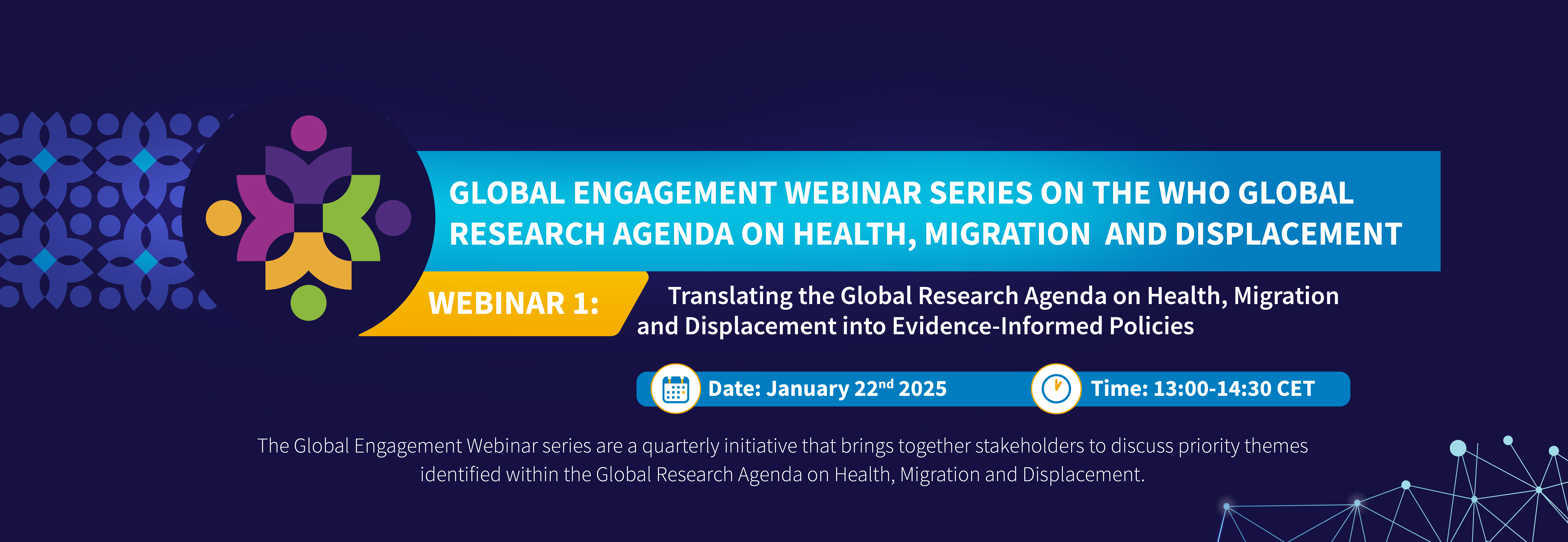
Background
Launched in 2023, the Global Research Agenda (GRA) on health, migration, and displacement identifies knowledge gaps and research priorities concerning the health of migrants and displaced populations at a global level while facilitating the translation of this knowledge into evidence-informed policies through an Implementation Guide and Toolkit.
This webinar, co-hosted by WHO Health and Migration, Division of UHC/Healthier Populations, and the Evidence-Informed Policy Network (EVIPNet), Research for Health Department, WHO Science Division, is the first in a planned series. It will bring together stakeholders in the field of health and migration—including policymakers, academics, UN agencies, and NGOs—to engage and mobilize efforts in translating the GRA into actionable policies and practices.
Invited speakers will discuss the GRA implementation roadmap, share examples of its application, and provide insights from country and regional experiences, reflecting on perspectives and lessons learned in translating evidence into policy. Attendees will have opportunities to engage in discussions and ask questions during a Q&A session.
Registration is open to all. We invite policymakers, academics and researchers, public health professionals and institutions, and UN agencies to join this event.
Event Objectives and Expected Outcomes
The webinar will explore case studies of effective integration of GRA priorities into policymaking, academic research, and public health practices. The event aims to identify gaps and challenges in knowledge translation, facilitate dialogues on adapting GRA implementation at regional and national levels, and promote multi-sectoral collaboration to enhance evidence-informed decision-making. Ultimately, the webinar seeks to mobilize key stakeholders to support the effective implementation of the GRA and translation into actionable policies and practices, contributing to inclusive and responsive healthcare systems for migrants, refugees, and host communities, through the engagement of policymakers, academics, and public health institutions.
Agenda
- Welcome address: Dr Santino Severoni - Director, WHO Health and Migration, Division of UHC/Healthier Populations, HQ
- Opening address: Dr John Reeder - Director, Research for Health Department, WHO Science Division, HQ
- Global Research Agenda- A WHO Health and Migration account of the Global Research Agenda, the implementation process, roadmap and progress to date: Dr Miriam Orcutt - Technical Officer, WHO Health and Migration, Division of UHC/Healthier Populations, HQ
- Examples of the implementation of the Global Research Agenda and/or national importance of contextualizing the Global Research Agenda
Chair: Dr Santino Severoni - Director, WHO Health and Migration, Division of UHC/Healthier Populations, HQ
Guest Speakers:
Dr Awad Mataria - Director of Universal Health Coverage, Health Systems, WHO EMRO
Dr Bernadette Kumar - Special Advisor, Norwegian Institute of Public Health, Norway
Dr Ibrahima Amadou Dia - Director of the African Centre for the Study and Research on Migration (ACSRM), African Union - Plenary discussion: Exploration of opportunities and challenges to implementation of the Global Research Agenda
Moderator: Dr Tanja Kuchemüller - Head, Evidence to Policy and Impact Unit, EVIPNet, Research for Health Department, WHO Science Division, HQ - Open Q & A session
Moderator: Dr Davi Mamblona Marques Romão - Consultant, Evidence to Policy and Impact Unit, EVIPNet, Research for Health Department, WHO Science Division, HQ - Closing: Dr Santino Severoni, Director, WHO Health and Migration, Division of UHC/Healthier Populations, HQ
